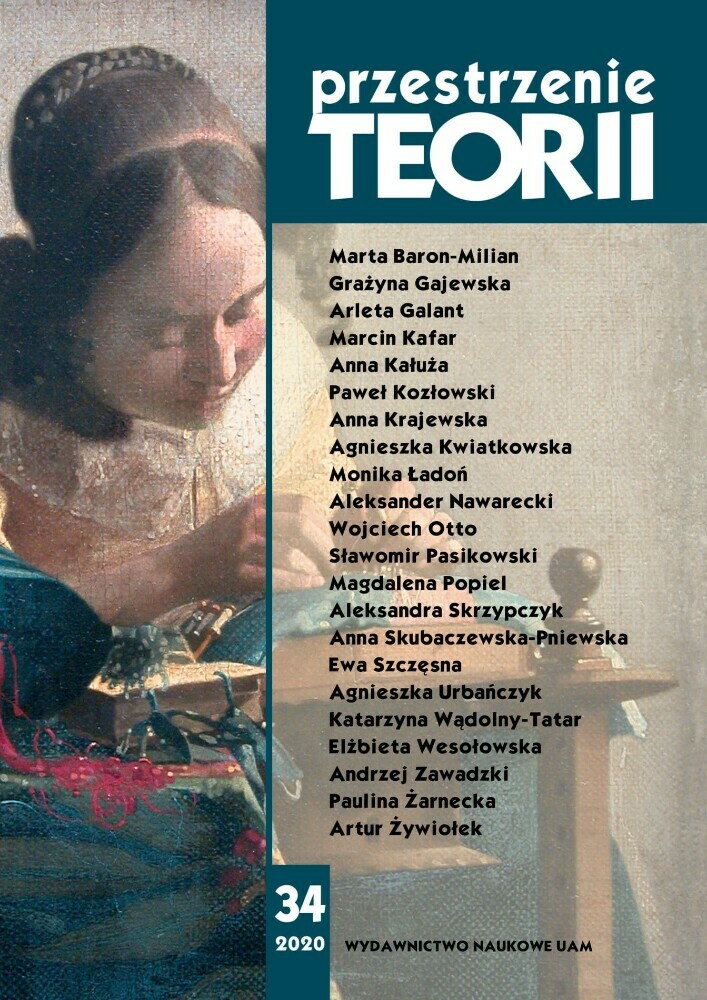Abstract
The article contains reflections on the “speculative realism”, a direction in 21st century philosophy initiated by Graham Harman, whose books (The Quadruple Object, Object-Oriented Ontology. A New Theory of Everything) continue and process Martin Heidegger’s concept of “the quadruple” (das Geviert), and they also use the ideas of such thinkers as Edmund Husserl and Bruno Latour. The basic problem formulated in this text arises from the following questions: is speculative realism another turn in scientific research, or rather a return to those sources of thinking that take into account the complexity and the irreducibility of reality to any metaphysical instance? What is the role of the “speculative turn” in cultural studies, in various interpretative practices?
References
Bielik-Robson A., Nowa Humanistyka. W poszukiwaniu granic, „Teksty Drugie” 2017, nr 1.
Blumenberg H., Prawowitość epoki nowożytnej, tłum. T. Zatorski, naukowo oprac. M. Falkowski, Warszawa 2019.
Falkiewicz A., Jeden i liczba mnoga, Wrocław 2016.
Greenberg C., Obrona modernizmu. Wybór esejów, tłum. G. Dziamski, M. Śpik-Dziamska, Kraków 2006.
Harman G., Art and Object, Cambridge 2020.
Harman G., Filozofia zwrócona ku przedmiotom contra radykalny empiryzm, tłum. M. Wiśniewski i K. Rosiński, „Kronos” 2012, nr 1.
Harman G., Książę sieci. Bruno Latour i metafizyka, tłum. G. Czemiel i M. Rychter, Warszawa 2016.
Harman G., Object-Oriented Ontology. A New Theory of Everything, UK/USA/Canada/Ireland/Australia/India/New Zeland/South Africa 2018.
Harman G., Traktat o przedmiotach, tłum. M. Rychter, przedmowa do polskiego wydania Sz. Wróbel, Warszawa 2013.
Heidegger M., Co zwie się myśleniem, tłum. J. Mizera, Warszawa 2017.
Heidegger M., O źródle dzieła sztuki, „Sztuka i Filozofia” 1992, nr 5.
Heidegger M., Odczyty i rozprawy, tłum. J. Mizera, Warszawa 2007.
Heidegger M., W drodze do języka, tłum. J. Mizera, Warszawa 2017.
Kierkegaard S., Albo-albo, część pierwsza, tłum. M. Hammermeister, Gdańsk 2014.
Kołakowski L., Husserl i poszukiwanie pewności, tłum. P. Marciszuk, Kraków 2003.
Latour B., The Pasteurization of France, transl. A. Sheridan, J. Law, Cambridge 1987.
Łotman J., Kultura i eksplozja, tłum. B. Żyłko, Warszawa 1999.
Łotman J., O semiosfierie, „Trudy po znakowym sistiemam”, XVII, Tartu 1984.
Mattéi J.-F., Heidegger et Hölderlin: le Quadriparti, Presses Universitaires de France (Coll. «Épiméthée»), Paris 2001.
Rosenzweig F., Gwiazda Zbawienia, tłum. T. Gadacz, Kraków 1998.
Rymkiewicz W., Edytorial, „Kronos” 2012, nr 1.
Scruton R., Przewodnik po kulturze nowoczesnej dla inteligentnych, tłum. J. Prokopiuk, J. Przybył, Łódź–Wrocław 2006.
Sławiński J., Wypowiedź literacka a wypowiedź filozoficzna: trzy kwestie i jedna ponadto, [w:] tegoż, Prace wybrane, t. IV [Próby teoretycznoliterackie], Kraków 2000.
Steiner G., Poezja myślenia. Od starożytnych Greków do Celana, Warszawa 2016.
Welsch W., Nasza postmodernistyczna moderna, tłum. R. Kubicki, A. Zeidler-Janiszewska, Warszawa 1998.
Wodziński C., Kairos. Konferencja w Todtrnaubergu. Celan – Heidegger, Gdańsk 2010.
Woźniak C., Martina Heideggera myślenie sztuki, Kraków 2004.
Žižek S., Dolar M., Druga śmierć opery, tłum. S. Królak, Warszawa 2008.
License
Authors
Authors of texts accepted for publication in Przestrzenie Teorii are required to complete, sign and return to the editor's office the Agreement for granting a royalty-free license to works with a commitment to grant a CC sub-license.
Under the agreement, the authors of texts published in Przestrzenie Teorii grant the Adam Mickiewicz University in Poznań a non-exclusive, royalty-free license and authorize the use of Attribution-NonCommercial-NoDerivatives 4.0 International (CC BY-NC-ND 4.0) Creative Commons sub-license.
The authors retain the right to continue the free disposal of the work.
Users
Interested Internet users are entitled to use works published in Przestrzenie Teorii since 2015, for non-commercial purposes only, under the following conditions:
- attribution - obligation to provide, together with the distributed work, information about the authorship, title, source (link to the original work, DOI) and the license itself.
- no derivatives - the work must be preserved in its original form, without the author's consent it is not possible to distribute the modified work, such as translations, publications, etc.
Copyrights are reserved for all texts published before 2015.
Miscellaneous
Adam Mickiewicz University in Poznań retains the right to magazines as a whole (layout, graphic form, title, cover design, logo etc.).

